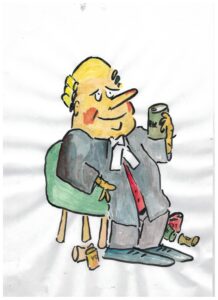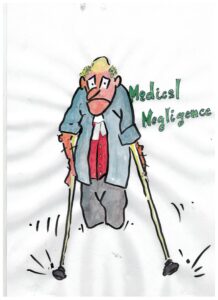Interrogatories in medical negligence
- 2016-03-23
- By whiggs
- Posted in Medical Negligence, Personal Injury, Practice & Procedure
Principles set out in [6]-[13] Rice v Ghabrial [2016] NSWSC 313
The issue of interrogatories is governed by the rules and generally requires that the interrogatories be “necessary”. In the case of personal injury matters, the rules also require that there be “special reasons” for the administering of the interrogatories.
These matters were dealt with by the Court, as presently constituted in Chong v Nguyen [2005] NSWSC 588. In Chong, the Court said:
“12 There has been some debate about the requirement for the question to be ‘necessary’. Most often reference is made to Boyle v Downs [1979] 1 NSWLR 192 at 204-5. The Court (Cross J) there confirmed that the word ‘necessary’ was to be interpreted as meaning ‘necessary for a fair trial’.
His Honour said:
‘In considering the meaning of the word “necessary” in Part 23 Rule 14 – a rule relating to discovery and inspection similar to Rule 5 in Part 24 relating to interrogatories – Rath J in Percy v General Motors-Holden’s Pty Ltd [1975] 1 NSWLR 289 interpreted it as “necessary in the interests of a fair trial”. This definition is similar to the one I have suggested; for in Griebart v Morris [1920] 1 KB 659, Scrutton LJ interpreted “necessary for disposing fairly of the cause or matter” (under the English rules relating to interrogatories) as “necessary for the fair trial of the action”.’
13 The Court of Appeal has referred with authority to that passage in Schutt v Queenan [2000] NSWCA 341 at [11], [12], [13], [14] and [15]. His Honour the President said:
‘The answers which are sought are material in the sense that they may enable the claimant either to maintain her own case or to destroy the case put against her’ (see Griebart v Morris [1920] 1 KB 659 at 664).
14 While other views have been expressed at various levels of the judicial hierarchy, the overwhelming authoritative view is that the Court must be satisfied that the order is ‘necessary in the interests of a fair trial’.
15 It is, in this case, essential in light of the arguments pressed, to examine the meaning of the word ‘necessary’ in that context.
16 The word ‘necessary’ when used in relation to a requirement on the exercise of a power granted to a court should generally and does here mean ‘reasonably required or legally ancillary’ to the achievement of the goal, in this case, of a fair trial. I refer to the joint judgment of Gaudron, Gummow and Callinan JJ in Pelechowski v Registrar, Court of Appeal (1999) 198 CLR 435 which, while determining whether there was a valid basis for contempt proceedings, examined the power of the District Court to issue injunctive relief. They said:
‘The term “necessary” in such a setting as this is to be understood in the sense given it by Pollock CB in Attorney-General v Walker (1849) 3 Ex 242, namely as identifying a power to make orders which are reasonably required or legally ancillary to the accomplishment of the specific remedies for enforcement provided in Division 4 of Part 3 of the District Court Act. In this setting, the term “necessary” does not have the meaning of “essential”; rather it is to be “subjected to the touchstone of reasonableness” (State Drug Crime Commission of NSW v Chapman (1987) 12 NSWLR 477 at 452).’ (my emphasis)”
Thus, in the context of UCPR r 22.1, the plaintiff must satisfy the Court that interrogatories are “reasonably required or legally ancillary” to the achievement of the goal, in this case, of a fair trial. In that sense, the word “necessary” in the relevant rule of the Court does not require that the order is “essential”.
Further, by operation of UCPR r 22.1(3), the Court is not to make such an order unless it is satisfied that “special reasons exist that justify the making of the order”.
A purposive construction of the above rule should be given. The purpose of requiring the Court to be satisfied of “special reasons” is to ensure that interrogatories in personal injury matters are not the ordinary course and to restrict the circumstances in which a Court will order interrogatories. As explained by Hall J in Keating v South East Sydney Illawarra Area Health Service (Supreme Court (NSW), Hall J, 7 July 2006, unrep at [24]-[25]), one relevant but not necessarily determinative criterion is the availability of the evidence otherwise.
The term “special” has been defined in a number of ways. The Macquarie Dictionary defines the term as “relating or peculiar to a particular person, thing, instance; having a particular function, purpose, of a distinct or particular character; being a particular one; extraordinary or exceptional”. In a somewhat circular fashion the aforesaid dictionary defines “exceptional” as “special” and the Oxford English Dictionary defines the term “exceptional” as “of the nature of or forming an exception; out of the ordinary course; unusual, special”.
It would seem on the basis of the foregoing and given the context in which the Court is required to be satisfied of special reasons, the UCPR provide that the Court must be satisfied that the basis for the issue of the interrogatories is unusual or out of the ordinary in the context of the class of personal injury actions.
I approach the exercise of my discretion with that test in mind and in the context of the provisions of s 56 of the Civil Procedure Act 2005 and following, namely, the achievement of an outcome that facilitates the quick, cheap and just resolution of the real issues in dispute between the parties.
SEARCH BLOG POSTS
LATEST BLOG POSTS
- Updated product safety mandatory reporting guidance for suppliers now available
- Pleading fraud – cause and effect is essential
- Does the Trustee’s right of indemnity have priority over the right of beneficiaries in relation to assets?
- Rules of war (in a nutshell) | The Laws Of War
- MH370 Final Report
Past Blog Posts
- December 2021
- September 2021
- August 2021
- May 2021
- April 2021
- March 2021
- August 2020
- February 2020
- September 2019
- February 2019
- December 2018
- July 2018
- April 2018
- December 2017
- May 2017
- February 2017
- December 2016
- November 2016
- October 2016
- September 2016
- August 2016
- April 2016
- March 2016
- October 2015
- September 2015
- August 2015
- May 2014
- April 2014
- March 2014
- January 2014
Categories
- Appeals
- Artificial Intelligence
- Aviation law
- Banking and Finance Law
- Blogs
- Civil Liability Act
- Class Actions
- Coding for lawyers
- common law
- Consumer Claims (TPA)
- Contract Law
- Contractual Interpretation
- Criminal law
- Deeds
- Docassemble
- duty of care
- Engineering Law
- Equity
- Evidence
- Exclusion Clauses
- Execution of documents
- Expert Witness
- featured
- Financial Services
- Fraud
- Fundraising (Chapter 6D)
- General comment
- Home Building Law
- Insurance
- Legal drafting
- Local Court
- Medical Negligence
- MH370
- Motor Accidents
- Negligence
- Occupiers negligence
- Other
- Personal Injury
- Personal Property Securities (PPSA)
- Pleading
- Practice & Procedure
- Products Liability
- Property
- Real Property
- Reasons for a decision
- Securitisation
- Security (Mortgages & Charges)
- Sentencing
- Swaps & Derivatives
- Teaching
- Transactional Law
- Transfer of financial assets in transactions
- Trusts & Trustee Law
- Uncategorized
- War and Weaponry
- Witnesses
SEARCH BLOG POSTS
LATEST BLOG POSTS
- Updated product safety mandatory reporting guidance for suppliers now available
- Pleading fraud – cause and effect is essential
- Does the Trustee’s right of indemnity have priority over the right of beneficiaries in relation to assets?
- Rules of war (in a nutshell) | The Laws Of War
- MH370 Final Report
Past Blog Posts
- December 2021
- September 2021
- August 2021
- May 2021
- April 2021
- March 2021
- August 2020
- February 2020
- September 2019
- February 2019
- December 2018
- July 2018
- April 2018
- December 2017
- May 2017
- February 2017
- December 2016
- November 2016
- October 2016
- September 2016
- August 2016
- April 2016
- March 2016
- October 2015
- September 2015
- August 2015
- May 2014
- April 2014
- March 2014
- January 2014
Categories
- Appeals
- Artificial Intelligence
- Aviation law
- Banking and Finance Law
- Blogs
- Civil Liability Act
- Class Actions
- Coding for lawyers
- common law
- Consumer Claims (TPA)
- Contract Law
- Contractual Interpretation
- Criminal law
- Deeds
- Docassemble
- duty of care
- Engineering Law
- Equity
- Evidence
- Exclusion Clauses
- Execution of documents
- Expert Witness
- featured
- Financial Services
- Fraud
- Fundraising (Chapter 6D)
- General comment
- Home Building Law
- Insurance
- Legal drafting
- Local Court
- Medical Negligence
- MH370
- Motor Accidents
- Negligence
- Occupiers negligence
- Other
- Personal Injury
- Personal Property Securities (PPSA)
- Pleading
- Practice & Procedure
- Products Liability
- Property
- Real Property
- Reasons for a decision
- Securitisation
- Security (Mortgages & Charges)
- Sentencing
- Swaps & Derivatives
- Teaching
- Transactional Law
- Transfer of financial assets in transactions
- Trusts & Trustee Law
- Uncategorized
- War and Weaponry
- Witnesses




